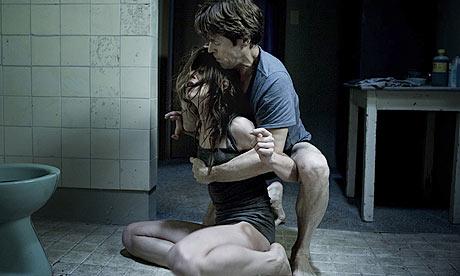Director: Lars von Trier
Starring: Willem Dafoe, Charlotte Gainsbourg
UK Release date: 24 July 2009
Certificate: 18 (109 mins)
I have never gone to a film with lower expectations. That’s what comes of reading reviews. And I have to confess, with shame, that this is actually the first 18-rated film I’ve seen since – well, at least since I turned 18, and that was so long ago that they were then (much more satisfyingly) X-rated. But I don’t think I was being unreasonable – a film entitled Antichrist does rather lead one to expect an elderly teenager attempting to shock for the sake of it, to push the boundaries of taste and decency to the limits of civilisation and make a fair bit of money in doing so. And the only enjoyment to be had would be in steadfastly refusing to be provoked (nothing in my experience annoys adolescents more – whatever their age).
The start does indeed lend itself to that expectation. There is a pretentious dedication to Andrei Tarkowski before the cheap hand-drawn titles daub their primary colours across the screen like a film student’s shorts and open to ‘He’ (Willem Dafoe) and ‘She’ (Charlotte Gainsbourg) having damp, slow-motion, monochrome sex in the kitchen, up against the tumble-dryer, while Nic, their toddler son, takes the opportunity of their distractedness to fall out of the first-floor window to die in the snow beneath. Over all, Charlotte Church sings Handel’s Lascia ch’io pianga, mia cruda sorte – ‘Let me weep over my cruel fate’.
There begins the story of a grief observed. But, as for C.S. Lewis, it is a double grief. It is ‘She’, the bereft childless mother, who collapses into a catatonic state of crippled psychotic patient-hood. And it is ‘He’ – the boy's father and caricature villain – a know-all psychotherapist, who rescues his grieving wife from the clutches of the allopathic, drug-pushing, medical-model psychiatrists in order to confront directly her deepest and darkest fears, in the ultimate hope of transcending her grief. His prescription is natural healing – rugged self-help in fashionable modern cognitive behavioural therapy: ‘What the mind can see and believe, it can achieve.’
So, armed with their cognitive therapy – their reasoned understanding of their Selves and their World – the two of them return to Nature: the rural idyll that is ‘Eden’, a log cabin high in the wooded mountains. And there, they descend bravely into the woods of von Trier's horrific imagination. He plays neatly with the stock figures of the genre; warnings are ignored and the progressively less subtle intimations of a terrible lurking Evil are explained by progressively less plausible suggestions in only half-believing voices. But this evil – as in Hitchcock – is not a supernatural force, but a complacently underestimated nature. Real Nature turns out to be red in tooth and claw. Thousands of acorns fall from the oak trees upon the land beneath – only one in a hundred years will take root and the rest will die unfulfilled. A sloe-eyed deer has a bloody stillbirth. A nestling falls from the nest, is torn apart by a crow and devoured still alive by rapacious ants. In the words of ‘She’, ‘Nature is Satan’s Church’. In the words of the fox, ‘Chaos Reigns’.
And in parallel expression of the destruction of the couple’s civilisation, morality and their notion of ‘love’, their frenzied couplings become progressively more violent, sadistic and ultimately lethal.
Steadily the Man of Reason and Enlightenment is overwhelmed by the irrational random forces of natural evil, and the universality of death, despair and meaninglessness. Eden is a world in which there is no God – or, better, no Incarnation – and so contains no Reason. However much they may have fed from the Tree of Knowledge, there is for ‘She’ and ‘He’ no understanding the Unreasonableness of Nature. ‘She’ descends further and further into amoral egotism, a personification of woman’s inhumanity to man. And all ‘His’ flailing and increasingly frantic attempts to make sense of it all collapse into ‘His’ own subconscious madness and are destroyed by powers of the nature ‘He’ thought he could control, the intrinsic evil of all human beings – until ‘He’ gradually comes to understand what the audience knew from the first frames: that it is not only ‘Her’ grieving which is abnormal, but ‘His’ too. And, in the end, even this most reasonable of men discovers within himself the power to... Well let’s not spoil it.
As a film, it is hugely well made. No matter where you stand on plot and characterisation, public taste and incarnational Christology, you have to hand it to the cinematography by Anthony Dod Mantle. Some of the dream sequences have a magnificent luminescent beauty that live long in the memory and inspire the dreams – and even maybe justify the dedication to Tarkowski.
For those concerned with the avoidance of impropriety, towards the end of the credits there is a slightly shame-faced admission of the use of body doubles: I don’t know what (or even how) Mr & Mrs Stramka were paid, but they earned every kroner. And interestingly, the film avoids the de rigeur disclaimer that ‘no animals were harmed in the making of this film.’
By the end, we have learned something about the natural human capacity for Evil. G.K. Chesterton once claimed that Original Sin was the one Christian doctrine that could be proved. Von Trier – a recent Catholic convert brought up by parents committed to communism, naturism and atheism – would agree. But is there also a corresponding and equally natural human capacity for Good? Any film that provokes such a question is surely worth a tenner of anybody’s money. So, at the risk of an urgent summons to the Provincial's office, I say: ‘Rush out and see it while you still can.’
Paul O?Reilly SJ
![]() Visit this film's official web site
Visit this film's official web site






